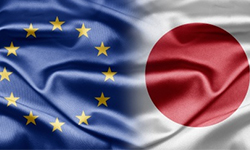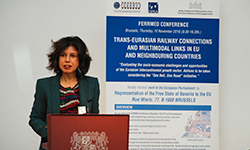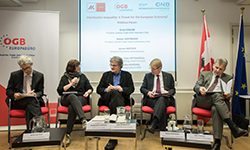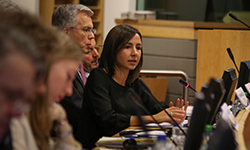BusinessEurope Headlines No. 2016-38
How to foster private investment in the EU
 During a discussion on how to foster private investment with European Fund for Strategic Investments (EFSI) Managing Director Wilhelm Molterer, BusinessEurope Director General Markus J. Beyrer, said “Weak investment in Europe is partially explained by the different crises we are facing and great uncertainty. But many barriers preventing investment are structural. That this is why we need to urgently hammer down legislative barriers to investment in order to make Europe a more attractive place to invest in”. During the discussion, organised by Bertelsmann Stiftung, Markus J. Beyrer added “The EFSI is only one of many tools to help fostering investment, but it is very welcome, also by promoting a greater risk culture in Europe and by helping to mobilise private investment.”
During a discussion on how to foster private investment with European Fund for Strategic Investments (EFSI) Managing Director Wilhelm Molterer, BusinessEurope Director General Markus J. Beyrer, said “Weak investment in Europe is partially explained by the different crises we are facing and great uncertainty. But many barriers preventing investment are structural. That this is why we need to urgently hammer down legislative barriers to investment in order to make Europe a more attractive place to invest in”. During the discussion, organised by Bertelsmann Stiftung, Markus J. Beyrer added “The EFSI is only one of many tools to help fostering investment, but it is very welcome, also by promoting a greater risk culture in Europe and by helping to mobilise private investment.”
Contact: Joana Valente
Time needed to find appropriate solution in geo-blocking proposal
 It is of crucial importance that the geo-blocking proposal is not rushed, as it could have far-reaching implications for companies. If the European Council needs more time to find appropriate legal solutions, in particular, on the question of applicable law, then this time should be taken. Especially, as the European Parliament has yet to make much progress on its consideration of the proposal. Still, we acknowledge the good progress made so far by the Slovak Presidency on this important proposal. These messages were sent to the Committee of Permanent Representatives in a joint letter from BusinessEurope, EuroCommerce, EMOTA and DIGITALEUROPE on the Council’s ongoing discussions on the Commission proposal for a regulation on geo-blocking.
It is of crucial importance that the geo-blocking proposal is not rushed, as it could have far-reaching implications for companies. If the European Council needs more time to find appropriate legal solutions, in particular, on the question of applicable law, then this time should be taken. Especially, as the European Parliament has yet to make much progress on its consideration of the proposal. Still, we acknowledge the good progress made so far by the Slovak Presidency on this important proposal. These messages were sent to the Committee of Permanent Representatives in a joint letter from BusinessEurope, EuroCommerce, EMOTA and DIGITALEUROPE on the Council’s ongoing discussions on the Commission proposal for a regulation on geo-blocking.
![]() Contact: Pedro Oliveira
Contact: Pedro Oliveira
BusinessEurope restates its priorities for the EU-Japan FTA negotiations
 European business recalled the importance of substance to prevail over speed in the EU-Japan Free Trade Agreement negotiations in a letter sent this week to the European Commissioner for Trade Cecilia Malmström. An ambitious and comprehensive agreement is the only one that makes sense for partners of our size, and while we encourage the acceleration of negotiations, substance should not be sacrificed for the sake of a rapid conclusion. In May this year, political leaders in Europe and Japan agreed to work towards a conclusion of the EU-Japan Free Trade Agreement by the end of 2016. The letter recalls our priorities in the EU-Japan FTA negotiations and enters into detail on some of the most pressing issues for European business that the agreement should resolve.
European business recalled the importance of substance to prevail over speed in the EU-Japan Free Trade Agreement negotiations in a letter sent this week to the European Commissioner for Trade Cecilia Malmström. An ambitious and comprehensive agreement is the only one that makes sense for partners of our size, and while we encourage the acceleration of negotiations, substance should not be sacrificed for the sake of a rapid conclusion. In May this year, political leaders in Europe and Japan agreed to work towards a conclusion of the EU-Japan Free Trade Agreement by the end of 2016. The letter recalls our priorities in the EU-Japan FTA negotiations and enters into detail on some of the most pressing issues for European business that the agreement should resolve.
![]() Contact: Maurice Fermont
Contact: Maurice Fermont
Competitiveness-enhancing measures are needed to advance the Single Market Strategy
 DG Justice has an essential role in policies which are at the heart of companies’ activities and which can encourage entrepreneurship in Europe. Measures that promote a second chance approach and access to digital tools throughout a company's lifecycle are needed to make Europe more competitive. Europe should also strive for a level playing field in e-commerce contract rules and a flexible legal framework around the data economy to avoid stifling innovation. For example, free flow of data is fundamental in an increasingly digitised industry. This was stressed by BusinessEurope’s Director General Markus J. Beyrer in a meeting with Director General Astola of European Commission DG Justice on 16 November.
DG Justice has an essential role in policies which are at the heart of companies’ activities and which can encourage entrepreneurship in Europe. Measures that promote a second chance approach and access to digital tools throughout a company's lifecycle are needed to make Europe more competitive. Europe should also strive for a level playing field in e-commerce contract rules and a flexible legal framework around the data economy to avoid stifling innovation. For example, free flow of data is fundamental in an increasingly digitised industry. This was stressed by BusinessEurope’s Director General Markus J. Beyrer in a meeting with Director General Astola of European Commission DG Justice on 16 November.
Contact: Pedro Oliveira
Message from South Africa: we are constantly working to improve our business environment
 A high-level delegation from the Department of Trade and Industry (DTI) of the Republic of South Africa visited BusinessEurope on 16 November. The discussion touched upon the general business climate in the country, on-going initiatives to update the Investment and Intellectual Property Rights legislation as well as the implementation of the EU-Southern African Development Community (SADC) Economic Partnership Agreement (EPA). South Africa’s growing and diversifying economy has the potential to become a hub for foreign investments. Although its main exports originate in the mineral sector, productivity in the manufacturing and services sectors is increasing, for instance in pharmaceuticals and renewable energy. Moreover, the EU-SADC EPA is expected to further accelerate this process, as it opens up more market access opportunities for both the EU and South Africa, including in the area of Geographical Indications (GIs). However, some South African policies raise concerns among European investors, e.g. the area of public procurement. A number of local content requirements need to be fulfilled by companies that would like to participate in tendering procedures. Companies that are interested in finding out more about investment opportunities in South Africa can check the InvestSA One-Stop-Shop initiative. BusinessEurope will remain in close contacts with its counterparts in South Africa and continue to promote the interests of European investors in South Africa.
A high-level delegation from the Department of Trade and Industry (DTI) of the Republic of South Africa visited BusinessEurope on 16 November. The discussion touched upon the general business climate in the country, on-going initiatives to update the Investment and Intellectual Property Rights legislation as well as the implementation of the EU-Southern African Development Community (SADC) Economic Partnership Agreement (EPA). South Africa’s growing and diversifying economy has the potential to become a hub for foreign investments. Although its main exports originate in the mineral sector, productivity in the manufacturing and services sectors is increasing, for instance in pharmaceuticals and renewable energy. Moreover, the EU-SADC EPA is expected to further accelerate this process, as it opens up more market access opportunities for both the EU and South Africa, including in the area of Geographical Indications (GIs). However, some South African policies raise concerns among European investors, e.g. the area of public procurement. A number of local content requirements need to be fulfilled by companies that would like to participate in tendering procedures. Companies that are interested in finding out more about investment opportunities in South Africa can check the InvestSA One-Stop-Shop initiative. BusinessEurope will remain in close contacts with its counterparts in South Africa and continue to promote the interests of European investors in South Africa.
Contact: Sofia Bournou
An improved railway connectivity is good for trade
 "The objective of improving railway connectivity within Europe and between Europe and Asia embraces two objectives - to improve the competitiveness of European companies and to lower the costs of trade", said Director of International Relations Luisa Santos during a keynote speech at the Ferrmed Conference. The conference focused on improving trans-eurasian railway connections and brought together experts from different fields and countries along the railway route. "Around 90 percent of global growth for the next several years is projected to take place outside of Europe, and all measures to facilitate trade will be beneficial for European companies."
"The objective of improving railway connectivity within Europe and between Europe and Asia embraces two objectives - to improve the competitiveness of European companies and to lower the costs of trade", said Director of International Relations Luisa Santos during a keynote speech at the Ferrmed Conference. The conference focused on improving trans-eurasian railway connections and brought together experts from different fields and countries along the railway route. "Around 90 percent of global growth for the next several years is projected to take place outside of Europe, and all measures to facilitate trade will be beneficial for European companies."
Contact: Maurice Fermont
China should heed global call for pro-competitive and non-discriminatory ICT security policies
 BusinessEurope co-signed a letter authored by a global coalition of 43 business associations expressing disappointment with China's Cybersecurity Law that entered into force last week. The letter, co-signed by associations from the US, Japan, Australia, Europe and Canada, explains that the Law falls significantly short in addressing the concerns expressed by the international business community. The measures introduced in the law will erect trade barriers, likely fail to achieve security objectives, burden industry and could undermine China's position as a globally integrated market. Global business associations now call on China to implement its past commitments to pro-competitive and non-discriminatory ICT policies in its pending cybersecurity regulations in other sectors.
BusinessEurope co-signed a letter authored by a global coalition of 43 business associations expressing disappointment with China's Cybersecurity Law that entered into force last week. The letter, co-signed by associations from the US, Japan, Australia, Europe and Canada, explains that the Law falls significantly short in addressing the concerns expressed by the international business community. The measures introduced in the law will erect trade barriers, likely fail to achieve security objectives, burden industry and could undermine China's position as a globally integrated market. Global business associations now call on China to implement its past commitments to pro-competitive and non-discriminatory ICT policies in its pending cybersecurity regulations in other sectors.
![]() Contact: Maurice Fermont
Contact: Maurice Fermont
Inequality discussion at Austrian Permanent Representation
 BusinessEurope’s Economics Director James Watson participated in a panel discussion at the Austrian Permanent Representation to the EU on 15 November on ‘Distribution Inequality: A Threat for the European Economy?’ James noted that recent globalisation has been a key driver of falling rates of global inequality, with over 1 billion people brought out of poverty globally since 1990. Inequality developments also vary considerably between developed economies, with the EU having not seen the rise in inequality experienced in the US, where inequality levels are also much higher. BusinessEurope believes that open markets both within and outside the EU can be a key driver of growth and employment, although it is important that trade openness is accompanied by appropriate polices, such as skills and in particular, life-long learning, to ensure the benefits of globalisation are enjoyed as widely as possible. Picture copyright: Julie de Bellaing
BusinessEurope’s Economics Director James Watson participated in a panel discussion at the Austrian Permanent Representation to the EU on 15 November on ‘Distribution Inequality: A Threat for the European Economy?’ James noted that recent globalisation has been a key driver of falling rates of global inequality, with over 1 billion people brought out of poverty globally since 1990. Inequality developments also vary considerably between developed economies, with the EU having not seen the rise in inequality experienced in the US, where inequality levels are also much higher. BusinessEurope believes that open markets both within and outside the EU can be a key driver of growth and employment, although it is important that trade openness is accompanied by appropriate polices, such as skills and in particular, life-long learning, to ensure the benefits of globalisation are enjoyed as widely as possible. Picture copyright: Julie de Bellaing
Contact: James Watson
Business community at Marrakech climate talks (COP22)
 The Marrakech climate conference is coming to an end. Interested where we stand so far? BusinessEurope has a dedicated webpage with two new blogs: the first summarizing the first week and the second reporting on the BizMEF-CGEM Business Dialogue held on Sunday 13 November.
The Marrakech climate conference is coming to an end. Interested where we stand so far? BusinessEurope has a dedicated webpage with two new blogs: the first summarizing the first week and the second reporting on the BizMEF-CGEM Business Dialogue held on Sunday 13 November.
Contact: Leon de Graaf
New position paper on VAT published
 This week, BusinessEurope presented its newly adopted position paper on the VAT Action Plan. The position paper makes a number of recommendations to improve the Action Plan, which was adopted by the European Commission in April 2016. BusinessEurope welcomes the Action Plan as it sets out a pathway for the creation of a single VAT area in the EU, in contrast to the present highly fragmented and complex system. Nevertheless, BusinessEurope also believes that more work needs to be done regarding the VAT collection methods and stresses that there must be an equal treatment of both domestic and cross-border suppliers and of goods and services. Furthermore, the position paper encourages the European Commission to come forward with an improved One-Stop-Shop and an EU VAT Web Information Portal.
This week, BusinessEurope presented its newly adopted position paper on the VAT Action Plan. The position paper makes a number of recommendations to improve the Action Plan, which was adopted by the European Commission in April 2016. BusinessEurope welcomes the Action Plan as it sets out a pathway for the creation of a single VAT area in the EU, in contrast to the present highly fragmented and complex system. Nevertheless, BusinessEurope also believes that more work needs to be done regarding the VAT collection methods and stresses that there must be an equal treatment of both domestic and cross-border suppliers and of goods and services. Furthermore, the position paper encourages the European Commission to come forward with an improved One-Stop-Shop and an EU VAT Web Information Portal.
Contact: Pieter Baert
Business support an extension of the European Fund for Strategic Investments (EFSI)
 “While on its own the EFSI cannot close the EU investment gap, it is a very good tool to mobilise private investment and provide a greater risk culture in Europe. But to succeed, it must come along a more forceful effort to hammer down existing barriers to investment,” said BusinessEurope’s Senior Adviser and Strategy Coordinator Joana Valente during a EESC hearing on 10 November. While the EFSI initial results are encouraging, the revised regulation must be agreed on the basis of the most recent evaluations and draw on the lessons learned so far. In particular, it must address the geographical coverage, additionality and maintain strong market-base logic.
“While on its own the EFSI cannot close the EU investment gap, it is a very good tool to mobilise private investment and provide a greater risk culture in Europe. But to succeed, it must come along a more forceful effort to hammer down existing barriers to investment,” said BusinessEurope’s Senior Adviser and Strategy Coordinator Joana Valente during a EESC hearing on 10 November. While the EFSI initial results are encouraging, the revised regulation must be agreed on the basis of the most recent evaluations and draw on the lessons learned so far. In particular, it must address the geographical coverage, additionality and maintain strong market-base logic.
Contact: Joana Valente
Cooperation in consumer enforcement increases trust in the markets
 BusinessEurope supports the approach to reinforce the existing national consumer authorities cooperation framework. In a single market without borders, it is essential that authorities are able to cooperate to tackle illegal practices which affect both consumers and fair competition. However, we have important concerns regarding the harmonisation of minimum powers of authorities. A list of powers as such will not guarantee uniform enforcement, as authorities would still be able to apply measures differently. In addition, certain powers can only be applied by courts. A stronger emphasis on fundamental rights such as due process, professional secrecy or right to an appeal is needed in the proposal. These messages are included in BusinessEurope recently adopted Comments on the Commission proposal on consumer protection cooperation regulation (CPC).
BusinessEurope supports the approach to reinforce the existing national consumer authorities cooperation framework. In a single market without borders, it is essential that authorities are able to cooperate to tackle illegal practices which affect both consumers and fair competition. However, we have important concerns regarding the harmonisation of minimum powers of authorities. A list of powers as such will not guarantee uniform enforcement, as authorities would still be able to apply measures differently. In addition, certain powers can only be applied by courts. A stronger emphasis on fundamental rights such as due process, professional secrecy or right to an appeal is needed in the proposal. These messages are included in BusinessEurope recently adopted Comments on the Commission proposal on consumer protection cooperation regulation (CPC).
![]() Contact: Pedro Oliveira
Contact: Pedro Oliveira
The safety of products sold online
 "Cross border e-Commerce is growing, but whether sold online or physically, the interests of businesses to ensure a market of safe products remains the same. Market surveillance is an illusion without necessary powers. Likewise, to reap the full benefits e-Commerce offers, authorities should hold appropriate actors responsible rather than focusing on easier to target actors in the distribution chain." This message was delivered by BusinessEurope’s Chair of the Free Movement of Goods Working Group Paul Coebergh van den Braak in a panel discussion at International Product Safety Week on Wednesday 16 November. He stated: “Market surveillance needs adequate resources, suitable facilities and skilled officers benefiting from high quality training in order to function effectively and efficiently. This requires considerable financial resources at a national and European level”. BusinessEurope’s strategy paper on Enforcement and Compliance for goods can be found here.
"Cross border e-Commerce is growing, but whether sold online or physically, the interests of businesses to ensure a market of safe products remains the same. Market surveillance is an illusion without necessary powers. Likewise, to reap the full benefits e-Commerce offers, authorities should hold appropriate actors responsible rather than focusing on easier to target actors in the distribution chain." This message was delivered by BusinessEurope’s Chair of the Free Movement of Goods Working Group Paul Coebergh van den Braak in a panel discussion at International Product Safety Week on Wednesday 16 November. He stated: “Market surveillance needs adequate resources, suitable facilities and skilled officers benefiting from high quality training in order to function effectively and efficiently. This requires considerable financial resources at a national and European level”. BusinessEurope’s strategy paper on Enforcement and Compliance for goods can be found here.
![]() Contact: Patrick Grant
Contact: Patrick Grant
Calendar
 07-18 November 2016: COP 22, Marrakech
07-18 November 2016: COP 22, Marrakech- 24 November 2016: EU-Ukraine summit, Brussels
- 28-29 November 2016: Competitiveness Council